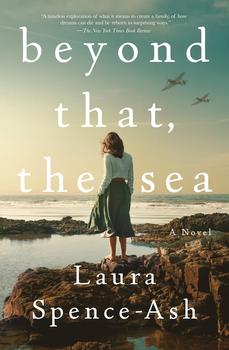Summary | Excerpt | Reading Guide | Reviews | Beyond the book | Read-Alikes | Genres & Themes | Author Bio

A Novel
by Laura Spence-AshA sweeping, tenderhearted love story, Beyond That, the Sea by Laura Spence-Ash tells the story of two families living through World War II on opposite sides of the Atlantic Ocean, and the shy, irresistible young woman who will call them both her own.
As German bombs fall over London in 1940, working-class parents Millie and Reginald Thompson make an impossible choice: they decide to send their eleven-year-old daughter, Beatrix, to America. There, she'll live with another family for the duration of the war, where they hope she'll stay safe.
Scared and angry, feeling lonely and displaced, Bea arrives in Boston to meet the Gregorys. Mr. and Mrs. G, and their sons William and Gerald, fold Bea seamlessly into their world. She becomes part of this lively family, learning their ways and their stories, adjusting to their affluent lifestyle. Bea grows close to both boys, one older and one younger, and fills in the gap between them. Before long, before she even realizes it, life with the Gregorys feels more natural to her than the quiet, spare life with her own parents back in England.
As Bea comes into herself and relaxes into her new life—summers on the coast in Maine, new friends clamoring to hear about life across the sea—the girl she had been begins to fade away, until, abruptly, she is called home to London when the war ends.
Desperate as she is not to leave this life behind, Bea dutifully retraces her trip across the Atlantic back to her new, old world. As she returns to post-war London, the memory of her American family stays with her, never fully letting her go, and always pulling on her heart as she tries to move on and pursue love and a life of her own.
As we follow Bea over time, navigating between her two worlds, Beyond That, the Sea emerges as a beautifully written, absorbing novel, full of grace and heartache, forgiveness and understanding, loss and love.
Prologue
OCTOBER 1963
Beatrix
Back then, Beatrix liked to sit next to Mr. G when he rowed them all to the mainland. She would watch the town come into focus, the buildings growing larger, the white steeple in relief against the bluest sky. This was in Maine, where the family went each summer, and it was during the war, although that was hard to remember when they were there. Mrs. G often wore a pink or yellow sundress, her pearls tight round her neck, and she squawked about getting wet as William and Gerald splashed each other with water. Mr. G would roll his eyes and half-heartedly tell the boys to stop, his glasses spotted with sea salt, his tanned arms moving the oars forward and back in a ...
Life seems to dangle, frozen, and each moment is perfectly captured by Spence-Ash, whose incredibly compelling descriptive narrative opens brief windows into the characters' lives. We also follow Beatrix's parents, back in London, in stark contrast to the life their daughter leads. Though she longs to return home, she is aware that her experiences of growing up will now always be split between two families in two countries — two very different worlds. The characters' stories do not conclude with the end of the war, however. Spence-Ash takes her readers on a journey spanning decades, first returning to both families in 1951 and then from 1960 to 1965. As Beatrix, William and Gerald grow up, they all must find their places in the world, which is particularly difficult in their post-war context...continued
Full Review
(530 words)
This review is available to non-members for a limited time. For full access,
become a member today.
(Reviewed by Maria Katsulos).
 Alice Elliott Dark, author of Fellowship Point and In the Gloaming
I was utterly captivated by this beautiful story from the first page to the last. The characters are so real, their feelings so well portrayed that I had to keep reminding myself that I don't actually know them. But I do! And I will return to the book to experience the well-wrought details of these lives again. This is a new favorite novel, and I can only hope Laura Spence-Ash has more coming soon.
Alice Elliott Dark, author of Fellowship Point and In the Gloaming
I was utterly captivated by this beautiful story from the first page to the last. The characters are so real, their feelings so well portrayed that I had to keep reminding myself that I don't actually know them. But I do! And I will return to the book to experience the well-wrought details of these lives again. This is a new favorite novel, and I can only hope Laura Spence-Ash has more coming soon. Ann Napolitano, bestselling author of Dear Edward
Beyond That, the Sea is a lovely, addictive novel. I was absorbed by the interesting premise―an eleven year old girl arrives to live, temporarily, with a new family―and by the myriad love stories that change and deepen over the decades the novel covers. Laura Spence-Ash has written a gorgeous novel filled with wonderful characters.
Ann Napolitano, bestselling author of Dear Edward
Beyond That, the Sea is a lovely, addictive novel. I was absorbed by the interesting premise―an eleven year old girl arrives to live, temporarily, with a new family―and by the myriad love stories that change and deepen over the decades the novel covers. Laura Spence-Ash has written a gorgeous novel filled with wonderful characters. Ann Packer, author of The Dive from Clausen's Pier and The Children's Crusade
This gorgeous novel, about the profound impact on children and families of even the most benign forms of displacement, marks the debut of a very gifted writer. I adored Laura Spence-Ash's characters and deeply admired her precise, resonant prose. Beyond That, the Sea is a marvel.
Ann Packer, author of The Dive from Clausen's Pier and The Children's Crusade
This gorgeous novel, about the profound impact on children and families of even the most benign forms of displacement, marks the debut of a very gifted writer. I adored Laura Spence-Ash's characters and deeply admired her precise, resonant prose. Beyond That, the Sea is a marvel. Claire Messud, bestselling author of The Emperor's Children and The Woman Upstairs
In this beautiful novel, Laura Spence-Ash renders the last century with painterly precision. Beyond That, the Sea tells the story of a British girl taken in by a prosperous New England family in the Second World War, and of the legacy of the intimate relationships that ensue―a story as rich and vital as life.
Claire Messud, bestselling author of The Emperor's Children and The Woman Upstairs
In this beautiful novel, Laura Spence-Ash renders the last century with painterly precision. Beyond That, the Sea tells the story of a British girl taken in by a prosperous New England family in the Second World War, and of the legacy of the intimate relationships that ensue―a story as rich and vital as life. Meg Wolitzer, The New York Times bestselling author of The Female Persuasion
Beyond That, the Sea is a shimmering dive into a lost past. With deft, beautiful prose, Laura Spence-Ash brings us into the worlds―both inner and outer―of two families in wartime, and over the years that follow. This novel is as haunting as it is accomplished.
Meg Wolitzer, The New York Times bestselling author of The Female Persuasion
Beyond That, the Sea is a shimmering dive into a lost past. With deft, beautiful prose, Laura Spence-Ash brings us into the worlds―both inner and outer―of two families in wartime, and over the years that follow. This novel is as haunting as it is accomplished..jpg) During World War II, the constant threat of German bombs falling on London and other key cities forced many English families to make an incredibly painful choice: whether to keep their children with them in this dangerous area or to separate from them, sending them away to places where they could hopefully live more safely and normally. Known as Operation Pied Piper, the evacuation of people from the cities, mostly children, started in September of 1939 and is estimated to have involved the relocation of almost 3.75 million residents. Many of the most famous portrayals of evacuees being relocated remain within England. In Crooked Heart, for example, Noel Bostock is sent to a suburb of London for his safety. Similarly, in perhaps the ...
During World War II, the constant threat of German bombs falling on London and other key cities forced many English families to make an incredibly painful choice: whether to keep their children with them in this dangerous area or to separate from them, sending them away to places where they could hopefully live more safely and normally. Known as Operation Pied Piper, the evacuation of people from the cities, mostly children, started in September of 1939 and is estimated to have involved the relocation of almost 3.75 million residents. Many of the most famous portrayals of evacuees being relocated remain within England. In Crooked Heart, for example, Noel Bostock is sent to a suburb of London for his safety. Similarly, in perhaps the ...
This "beyond the book" feature is available to non-members for a limited time. Join today for full access.

If you liked Beyond That, the Sea, try these:

by Wendy Chin-Tanner
Published 2024
A transcendent debut novel about family, love, and belonging, set against the backdrops of 1950s New York City and a historical leprosarium in Louisiana, following one young man's quest to not only survive, but live a full and vibrant life

by Jennifer Rosner
Published 2024
From Jennifer Rosner, National Jewish Book Award Finalist and author of The Yellow Bird Sings, comes a novel based on the true stories of children stolen in the wake of World War II.





